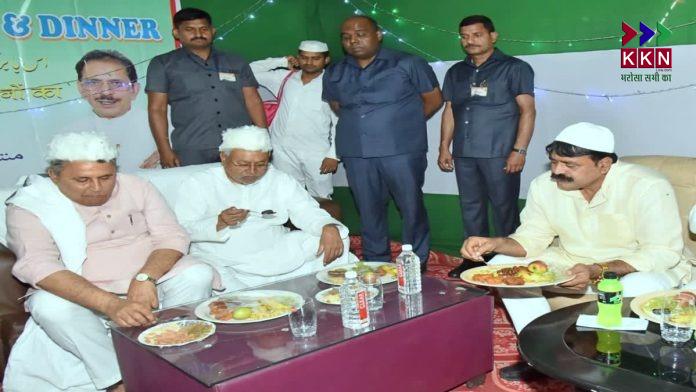KKN Gurugram Desk | The political Iftar season has officially started in Bihar, with Chief Minister Nitish Kumar hosting an Iftar party at his official residence. This event is significant not only as a religious gathering but also as a political gesture, with a wide range of people, from the common masses to prominent personalities, being invited. Traditionally, the Iftar party held every year at the Chief Minister’s residence in 1 Aney Marg (the official address) has often acted as a backdrop for political maneuvering, where subtle political messages and alliances are formed.
Article Contents
Nitish Kumar’s Iftar Party: A Political Affair
Nitish Kumar’s Iftar party is a longstanding tradition in Bihar, where various political leaders, social workers, and bureaucrats come together during the month of Ramadan. However, this year, the event has sparked a political controversy. Some of the major Muslim religious organizations in the state have announced a boycott of the event. The announcement comes as a significant blow to the CM’s ongoing attempts to maintain political harmony and engagement with the state’s Muslim community.
The Boycott: A Strong Political Statement
In a statement released by Imarat-e-Sharia, a leading Muslim religious organization in Bihar, it was revealed that several prominent Muslim organizations have decided to boycott Nitish Kumar’s Iftar party. These organizations include the All India Muslim Personal Law Board, Imarat-e-Sharia, Jamiat Ulema-e-Hind, Jamiat Ahle Hadis, Jamaat-e-Islami Hind, Khanqah Mujibiya, and Khanqah Rehmani, among others. The organizations have not only declared their boycott but also sent a letter to the Chief Minister regarding their decision.
The reasons behind the boycott stem from the growing discontent among the Muslim voters in the state. The political climate in Bihar, especially in relation to the Muslim community, has been tense over the past few years. The fallout can be traced back to the 2020 Bihar Legislative Assembly elections, where Muslims showed their dissatisfaction with Nitish Kumar’s policies and leadership. The same trend was observed in the 2024 general elections, with a noticeable shift in Muslim voting patterns. The dissatisfaction among the Muslim community continues to linger, and the boycott of the Iftar party is a clear indication of the strained relationship between Nitish Kumar and a significant section of his voter base.
The Impact of Muslim Voter Sentiment on Bihar Politics
Muslim voters play a crucial role in determining the outcome of elections in Bihar, with several constituencies depending on their votes. Nitish Kumar, aware of the importance of the Muslim vote, has been trying to mend fences with the community. The growing distance between Nitish Kumar and the Muslim community could have significant repercussions, especially with the upcoming elections on the horizon. If this discontent continues to fester, it could negatively impact Nitish Kumar’s political standing, especially in constituencies where the Muslim vote holds the balance of power.
The Muslim community’s disillusionment stems from multiple issues, including the perceived lack of representation in the government and dissatisfaction with the handling of communal issues. For Nitish Kumar, keeping the Muslim vote intact is crucial for his political survival, particularly with the upcoming assembly elections where many seats will be influenced by this demographic.
Bihar’s Political Landscape Ahead of the 2025 Elections
Bihar is set to hold state elections in 2025, and the political stakes are high. Nitish Kumar’s party, the Janata Dal (United) or JD(U), has historically relied on a broad coalition of votes, including a significant share from the Muslim community. However, with the shifting political sentiments, especially among Muslim voters, the 2025 elections will prove to be a challenging battleground. Nitish Kumar, who has always tried to maintain a delicate balance between various communities, now faces a unique situation where his government must work hard to regain the trust of the Muslim electorate.
As political discussions and negotiations continue to unfold, the Iftar boycott serves as a reminder of the deepening rift between Nitish Kumar and the Muslim community. The coming days will be crucial for the Chief Minister as he navigates the complexities of managing political relationships, especially with key voter segments in Bihar. With political alliances forming and breaking rapidly, the road to the 2025 elections will be marked by intense political maneuvering, and Nitish Kumar’s ability to restore relations with the Muslim community will be pivotal in shaping the future of Bihar’s politics.
The Iftar party held by Nitish Kumar was not just a religious or cultural event, but a political statement. The boycott by major Muslim organizations signals an ongoing crisis of confidence in his leadership among the Muslim community. The upcoming Bihar elections will certainly be influenced by these developments, and Nitish Kumar must find a way to bridge the gap and rebuild trust if he wants to secure a favorable outcome for his party in 2025.




